Search
Viewing 1350 to 1365 of 3120 news
-
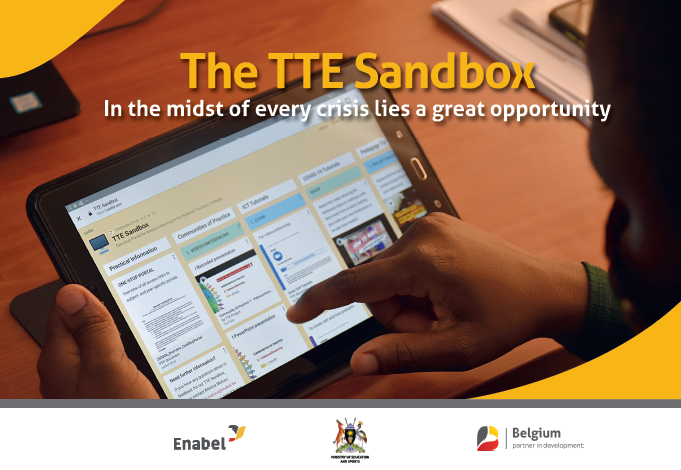
The TTE Sandbox Innovation in Uganda
Dorothy KYAMAZIMA | 22/11/2022
A booklet detailing the digital journey of the TTE Sandbox and Enabel's journey in creating digital solutions to improve teacher training in Uganda. Click here for more on the Sandbox innovation: https://padlet.com/TeacherTrainingUganda/KMBoardTTE/wish/2393683455
-
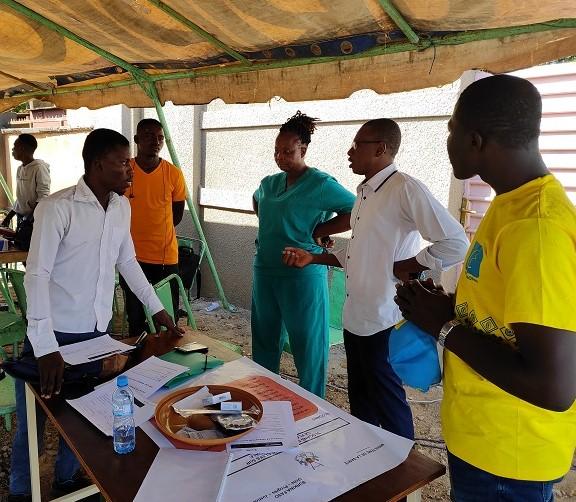
Au Burkina Faso, Enabel appuie l'organisation de la semaine nationale de la planification familiale
Kimsegninga SAVADOGO | 21/11/2022
Enabel à travers son intervention Santé &, Droits Sexuels et Reproductifs (SDSR) a accompagné la Direction régionale de la santé et de l’hygiène publique du Centre -Est dans l’organisation de la 11ème édition de la Semaine Nationale de la Planification familiale (SNPF) célébrée cette année du 07 au 13 novembre dans toutes les régions et districts sanitaires du pays sous le thème « accès aux soins et services de planification familiale de qualité dans un contexte de crise humanitaire ». Dans ce cadre, plusieurs activités ont été organisées:des conférences au profit des élèves de cinq (5) établissements scolaires dans les provinces du Boulgou et du Kouritenga sur le thème « planification familiale, infections sexuellement transmissibles et grossesses en milieu scolaire » ; une émission radiophonique sur la planification familiale, les violences basées sur le genre, animée par une artiste musicienne produite par le programme SDSR et des acteurs de la Direction régionale de la santé et de l’hygiène publique ainsi que de la Direction régionale en charge du genre de la région du Centre -Est ; des animations de stands au Centre mère-enfant de Tenkodogo et au centre jeunes de Tenkodogo. La SNPF est organisée au Burkina Faso depuis 2012 par le Ministère de la santé et de l’hygiène publique, avec l’appui des Partenaires techniques et financiers intervenant dans le domaine de la planification familiale. Elle se révèle être une excellente stratégie de promotion de la planification familiale à travers le plaidoyer auprès des autorités politiques et administratives, les leaders coutumiers, religieux et communautaires.
-
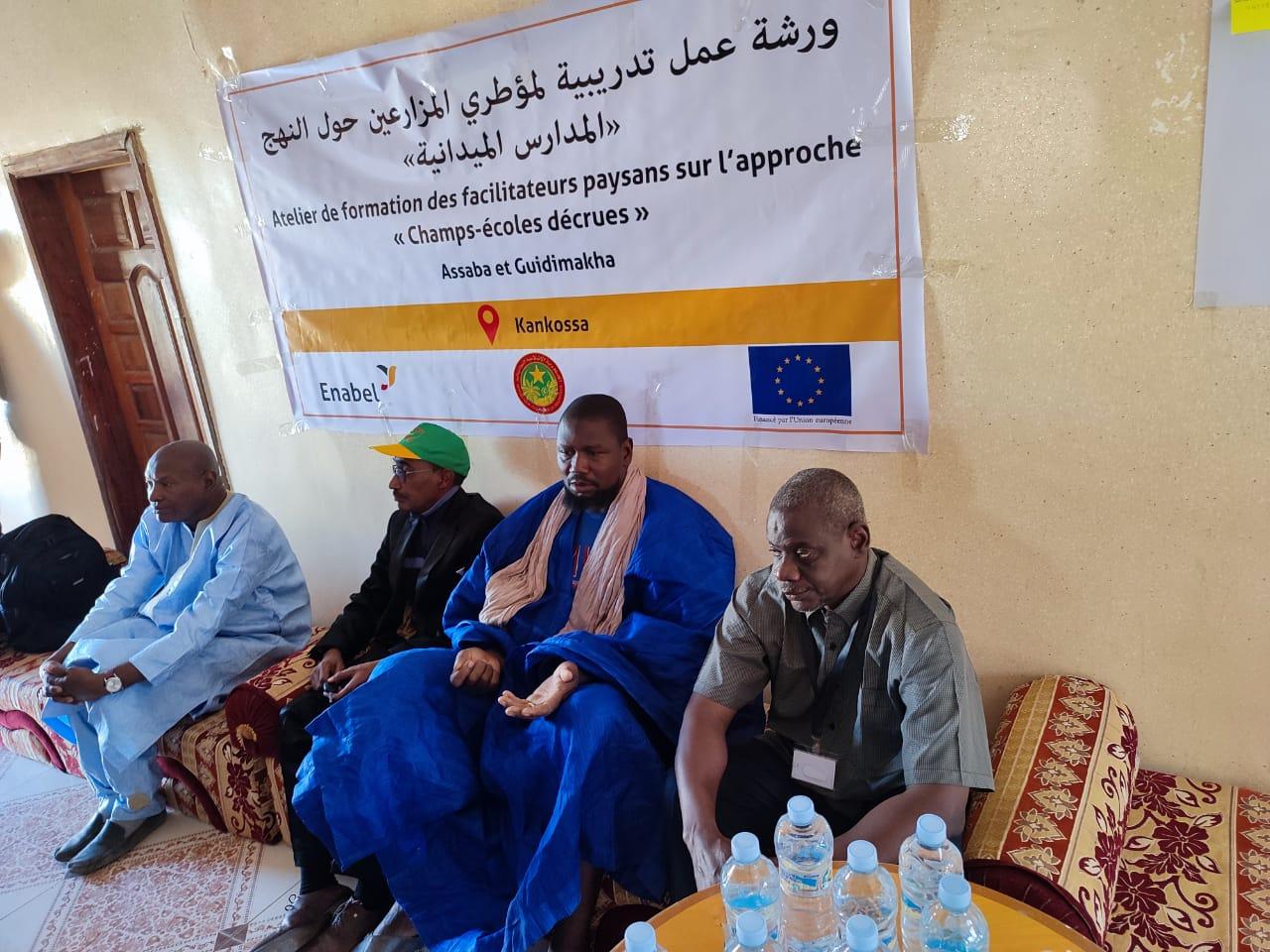
Mauritanie: Atelier de formation champs écoles décrues à Kankossa
Aminata KANE | 21/11/2022
Le 21 novembre 2022 a lieu l'ouverture de l'atelier de formation Champs écoles décrures_3éme génération à Kankossa. Les producteurs agricoles et les éleveurs sont un des groupes cibles du Programme RIMFIL financé par @UEMauritanie. RIMFIL contribue à la mise en place d´un dispositif structuré et durable de conseil agro-pastoral de proximité dans les bassins de production. Ce dispositif est basé sur la formation de formateurs « facilitateurs-paysans » au niveau de Champs-écoles agricoles et pastoraux (CEAP). Le programme met en valeur les savoirs-faires locaux et la co-identification d’innovation. Un « master-trainer » accompagne les facilitateurs et permet à ces agriculteurs et éleveurs sélectionnés au sein de leurs communautés d’acquérir et de diffuser à leur tour des innovations techniques qui améliorent leur productivité et qui encouragent l'adoption de techniques adaptées au changement climatique.
-
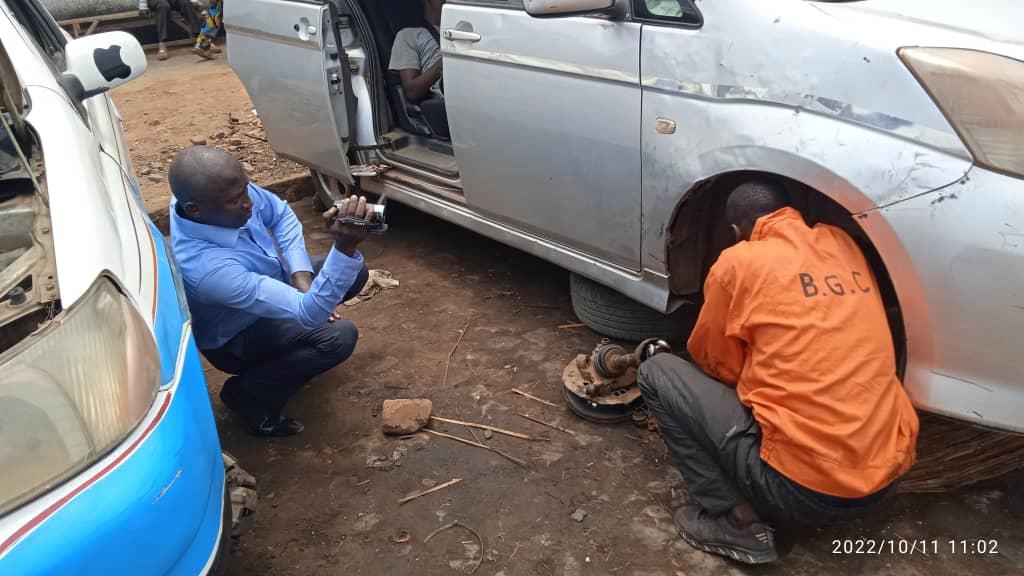
Burundi : Finale de remise des prix pour les gagnants du concours « vidéothon »!
Donavine KWIZERA | 18/11/2022
L’Enseignement des Métiers au Burundi souffre de préjugés qui le rend peu attractif au niveau des jeunes apprenants. Mais les Centres d’Enseignement des Métiers appuyés par le projet d’Appui Complémentaire à la Formation Professionnelle et Technique (ACFPT)/Enabel sont déterminés à inverser la tendance. Grâce à deux ateliers de création et une journée de tournage dans chaque centre, 11 centres partenaires du projet ACFPT ont filmé et monté 11 vidéos sur 11 métiers : Agri-élevage, Maçonnerie, Mécanique, Électricité, Plomberie, Hôtellerie-tourisme, TAA, Menuiserie, Soudure, Bureautique et Couture. Dans ces vidéos, des apprenants, formateurs techniques, lauréats ou artisans racontent des histoires personnelles de leur pratique quotidienne pour répondre à la question « Pourquoi avez-vous choisi votre métier ? ». Les objectifs de l’activité étaient de mettre en évidence les atouts de l’Enseignement des Métiers, de renforcer les compétences des formateurs en narration, prise d’image et montage vidéo, de créer des vidéos utilisables dans le dispositif d’orientation des futurs apprenants et de sensibiliser sur l’égalité des genres au niveau des métiers. Les centres ont participé à cette nouvelle activité avec beaucoup d'enthousiasme et de motivation. Après cette trajectoire de presque trois mois, nous sommes impatients de voir les gagnants du concours ! Ceux-ci seront désignés par un jury d'experts dans 3 catégories : meilleur scénario, meilleur vidéo-montage et meilleure vidéo qui brise les stéréotypes du genre. Alors, c’est parti pour la grande finale du Vidéothon : la remise des prix aura lieu le 25 Novembre 2022 pendant une cérémonie finale festive. Voulez -vous savoir plus sur le concours Videothon ?Cliquez ici Open.Enabel - Belgian Development Agency / Burundi : Lancement du concours « Vidéothon », qui va renforcer l’attractivité des Centres d’Enseignement des Métiers par la digitalisation!
-
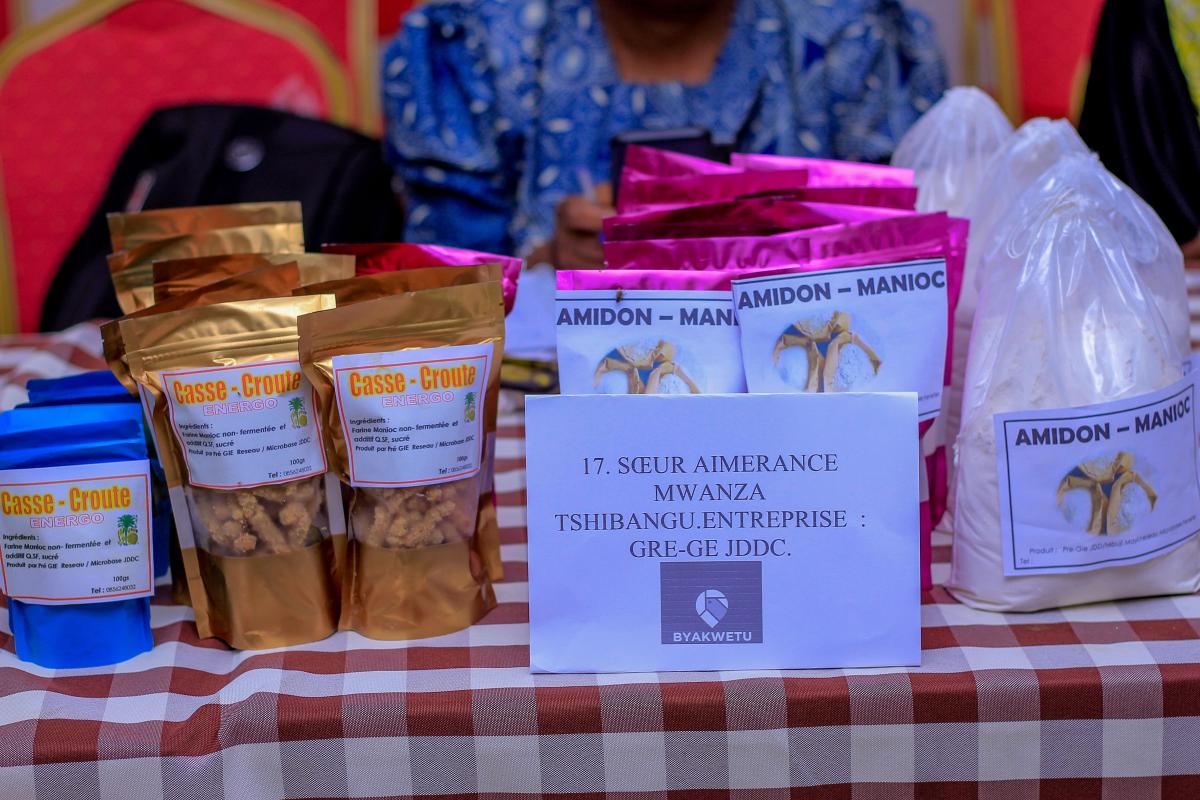
RDC: Organisation de la conférence Byakwetu, pour inciter à la consommation des produits locaux
Grâce MALI FAIDA | 17/11/2022
La conférence Byakwetu a eu lieu du 27 au 29 Octobre 2022 dans la ville de Mbujimayi à l’hôtel METROPOLE avec pour thème phare « Incitation à la consommation des produits locaux ». « Ce thème est un appel intense et énergique à la population du Kasai Oriental pour l’implication des acteurs locaux dans la recherche des solutions aux problèmes communautaires en vue d’assurer la pérennisation des acquis de son appui au secteur de l’entreprenariat et du développement secteur Privé. » Joël MEERSSEMAN, Portfolio Manager Kasaï Oriental, Lomami et Sankuru.L’objectif de ce rendez-vous business « Byakwetu » est de consolider ce réseau de producteurs locaux, dans cette région du Kasaï riche en potentiel agricole, minier, et surtout humain, avec une rencontre qui pousse à la concrète consommation des produits « MADE IN KASAÏ », à l’échelle locale, nationale et exportable. En filigrane, ces trois journées ont permis aux personnes désireuses d’investir dans le Grand Kasaï d’être en contact avec les acteurs clés du climat des affaires local, afin d’obtenir des informations en toute sécurité et rentabilité.Les participants à ce forum sont issus de l’environnement socio-économique et politique de la ville de Mbujimayi dont : 10 panelistes composés des entrepreneurs, consommateurs et autorités 30 exposants sur stand de produits locaux Un auditoire de 500 participants en salle composés des clients de l’incubateur, entrepreneurs, producteurs, artisans, etc.
-
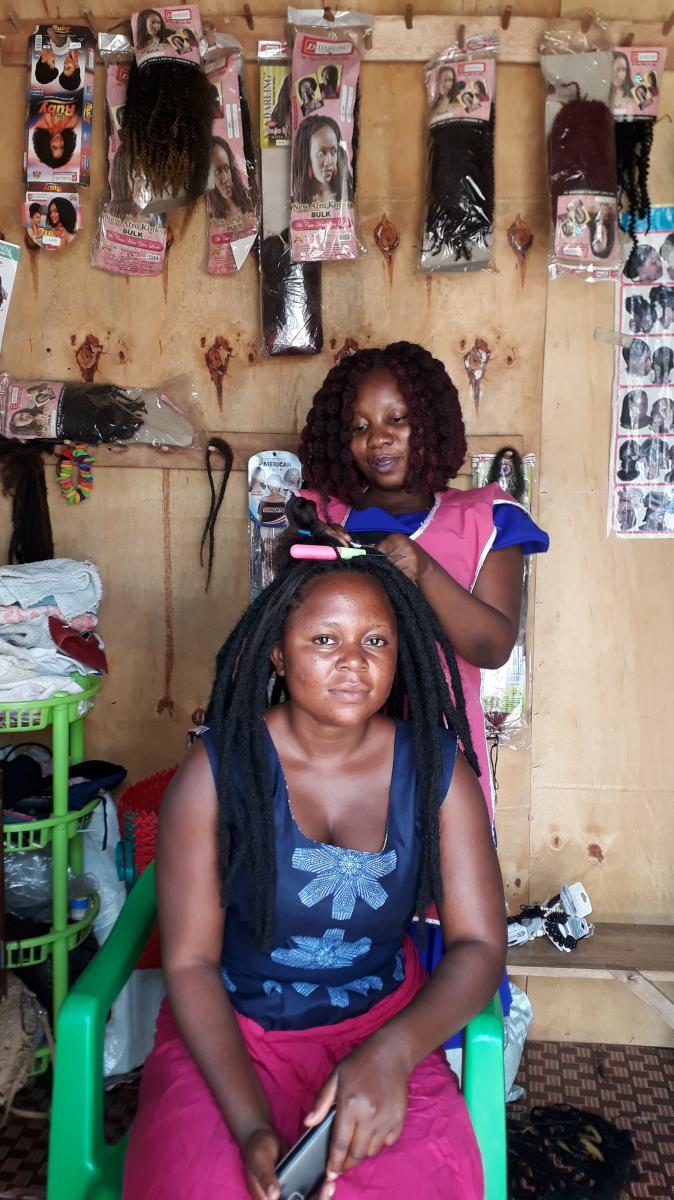
Uganda: House help turned entrepreneur
Catherine BEKUNDA | 17/11/2022
There is a common adage; “your dreams are valid”. This applies to Jenipher Masika who since childhood aspired to become a hair dresser. She had always been amazed by the transformation women experienced after visiting a salon. Born 26 years ago in Karambi Sub- County in Kasese District in a family of 6 children, she describes her childhood as ‘normal’ meaning it was not different from the lives of other peasant farmers. This however took a twist following the death of her father when she was 6 years old. This meant that her mother had to now shoulder the responsibility of raising the six of them. It was tough. Masika’s mother struggled to educate her daughter up to ordinary level. The school fees problem worsened. There was no money. With no one else to turn to, Masika had to painfully dropout of school. To provide for her needs, she looked for a job. Masika was hired as a maid, a job she did for two years. It is during this time that she heard an announcement on radio about a skilling opportunity at Karambi Action for Life Improvement (KALI), a Nongovernmental Organisation in Kasese. The organisation had received funding from Enabel to train 65 young people in labour market relevant skills. Masika considered it an excellent opportunity of fulfilling her childhood desire so she wasted no time in applying. And few weeks later, she was delivered good news. “I was very excited to receive my admission to the course I have always wanted – hairdressing. I knew my future was going to be bright,” a beaming Masika recollects. The training was very practical. ” We were given training materials which made learning easy and enjoyable,” she says. Masika trained for 4 months. Upon completion of training, Enabel gave her startup kits which enabled her and course mates to jointly establish a saloon. “From this salon, I saved enough money to start my own. I am now self-reliant and even support my mother and siblings when they get a problem,” Masika shares. “I also save 5,000 shillings per week in the community saving scheme.” The twenty-six-year-old says the business is growing. But like any other business, there are challenges. The saloon business requires adequate water and electricity supply. Unfortunately, both are scarce in this part of the country. Supporting other girls Having experienced a challenging childhood, Masika felt duty bound to support other girls. She trains girls interested in acquiring her skill free of charge. One of her trainees is a university graduate. In the next 5 years, using savings from her saloon business, Masika plans to construct some rental units to supplement her income. She also wants to further her studies in cosmetology to diversify her clientele. Masika is one of the young people trained by Enabel through the Support to Skilling Uganda project. The initiative aims to equip youth, women and girls with labour market relevant technical and vocational skills to enhance their employability. The project is funded by the Kingdom of Belgium.
-
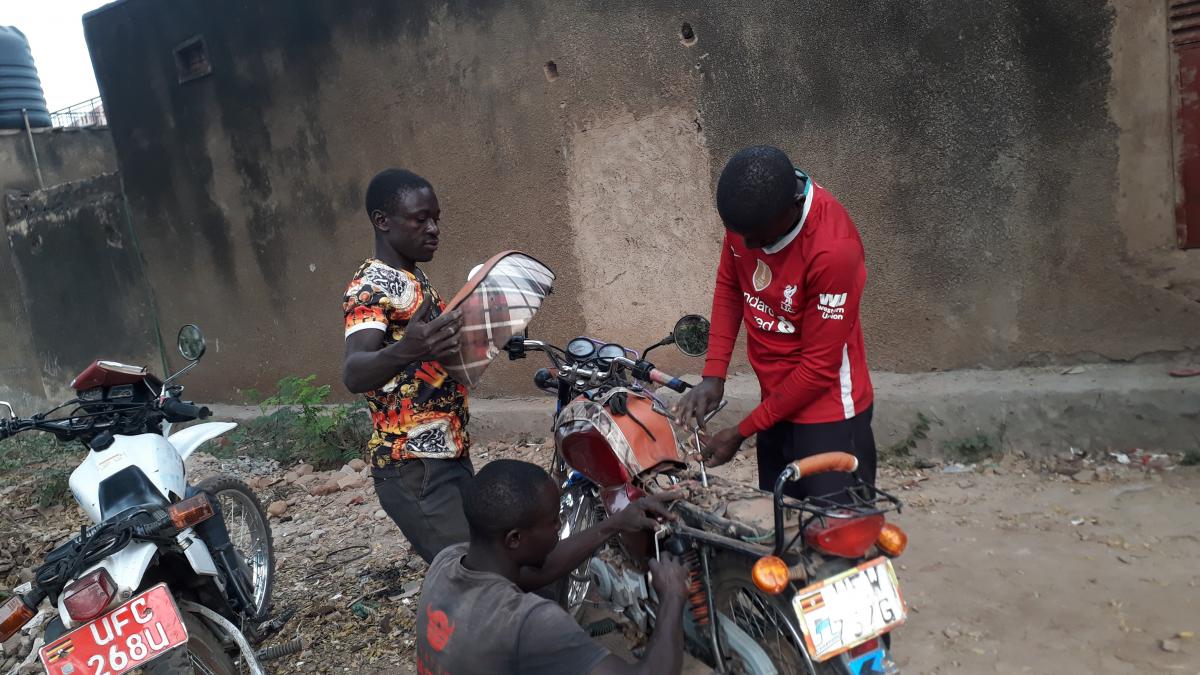
Uganda: Skills development secures Kizza’s future
Catherine BEKUNDA | 17/11/2022
It is a sunlit mid-morning in Kisaka II Village, Bwera Sub-County, Kasese district in Western Uganda. Kasese is few kilometers away from the Uganda - Democratic Republic of Congo border. Cross border business is common in this part of the country so the area is busy. Alfred Kizza and his 3 counterparts are busy conversing as they fix a motorcycle. Their duty station is called KK Garage and Spare parts. They mainly repair motorcycles and sale their spare parts. “I was born and raised in this village,” says the 24-year-old. “I stopped in primary seven, my parents couldn’t afford educating me beyond this level.” After dropping out, Kizza had to find a means of survival. Unfortunately, he didn’t have a skill so the best Kizza could offer was casual labour. “I was paid very meager wages yet I did a lot of work,” the P7 leaver narrates. “This made me to lose hope for a better future.” Turning point One day a neighbour told Kizza an announcement he heard on one of the local radio stations. Kizza’s home did not have a radio set. The announcement said Alliance for Children and Youth (A4CY), a Nongovernmental organisation in partnership with Enabel was looking for 50 needy young people to train in vocational skills. All training costs were catered for by Enabel and A4CY. “I was very interested so immediately applied to train in motorcycle mechanics. They considered me for the training,” Kizza says. “I enrolled for the course because I wanted a good life like others.” He successfully completed the training few months later. The training included a model on entrepreneurship and basic financial literacy. “We were requested to form groups after graduation,” he explains. “The group was later given a toolbox as a startup kit to help members to establish a business.” This was how KK Garage and Spare parts was born. They have since gone ahead to acquire more toolboxes using revenue from the businesses. They also expanded their clientele using a simple formula. “We market our businesses by doing excellent work to ensure customers return and refer new clients,” he says. They plan to continue working together and buy each member a piece of land, start training other youths and further expand the business. Kizza was trained through the Support to Skilling Uganda project implemented by Enabel and Ministry of Education and Sports with funding from the Kingdom of Belgium. The project aims increase the employability of youth through better quality of instruction and by making training more responsive to the needs of the labour market.
-
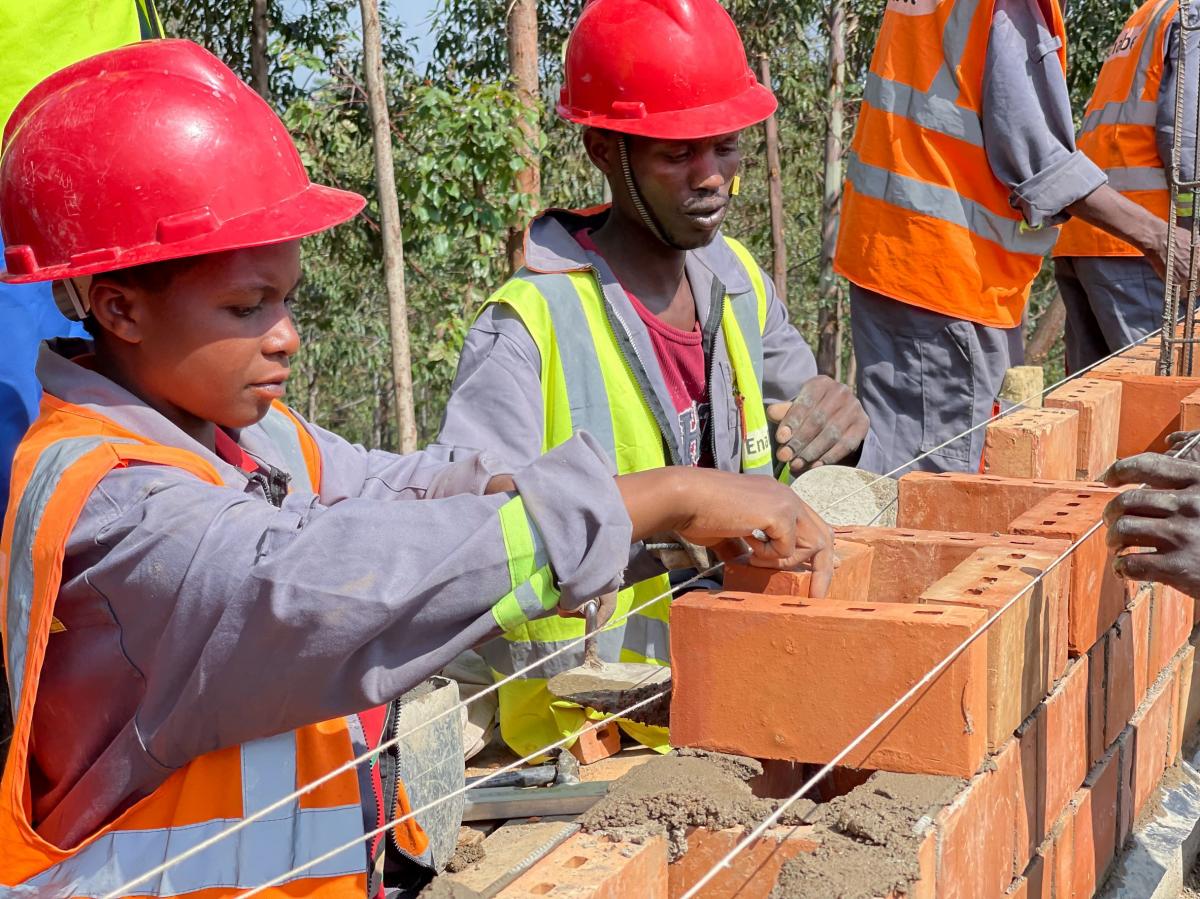
Au Burundi, zoom sur les « chantiers-formation » : un mécanisme d’apprentissage entre pairs et d’insertion des jeunes dans les métiers du bâtiment
Donavine KWIZERA | 17/11/2022
Les chantiers-formation pratiqués par le projet ACFPT de Enabel au Burundi permettent de réaliser des infrastructures par et pour les centres de formation. En effet, le principe est de construire des extensions ou réhabilitations d’infrastructures d’un centre de formation en partie avec les lauréats issus de l’enseignement des métiers des filières bâtiment de ce même centre, dans une démarche de formation pratique additionnelle et d’insertion.Alliant production et formation, les lauréats qui travaillent sur ces chantiers sont accompagnés par des ouvriers qualifiés afin de renforcer leurs compétences professionnelles, et tous deux bénéficient de l’encadrement d’un conducteur de chantier professionnel et performant. Ainsi, le dispositif chantier-formation permet de renforcer les compétences professionnelles dans les métiers du BTP sur le principe de la transmission du savoir-faire et du savoir être entre pairs. Enabel à travers le projet ACFPT vient de réaliser au cours de l’année 2022 pas moins de 5 chantiers formations dans les centres d’enseignement des métiers (CEM) partenaires du projet, tels que des murs de clôture pour sécuriser les centres, l’aménagement d’ateliers de transformation agro-alimentaire et la transformation d’une salle multimédia.Les cinq chantiers-formation représentent un investissement total de 513 000 Euros, dont 145 000 Euros pour les bourses de stage, indemnités et assurances individuelles. Au total, ce sont 88 lauréats des filières du Bâtiment Travaux Publics (BTP) issus des centres de formation qui ont été à l’œuvre avec 358 artisans et ouvriers qualifiés des Provinces de Karusi, Cibitoke, Muramvya, Muyinga et Rumonge sur une période de 4 mois.Enabel veille à travers cette activité également à favoriser l’insertion professionnelle pour les lauréats garçons et filles au-delà du chantier-formation. Ainsi, chaque participant a bénéficié d’une séance de sensibilisation d’éveil à l’esprit entrepreneurial et à l’épargne. Enfin, l’accès aux mères a été facilité par l’octroi d’une indemnité supplémentaire permettant de faire garder leurs enfants en dehors du chantier au cours de la journée de travail.Sur les 5 chantiers, 184 filles ont pu avoir l’expérience d’insertion offerte par le dispositif de chantier-formation, et une dizaine de lauréats ont trouvé ensuite un travail chez les ouvriers qualifiés de la Région. Visitez notre vidéo pour savoir plus sur le chantier formation :https://youtu.be/3mpk-ThZ6s4
-
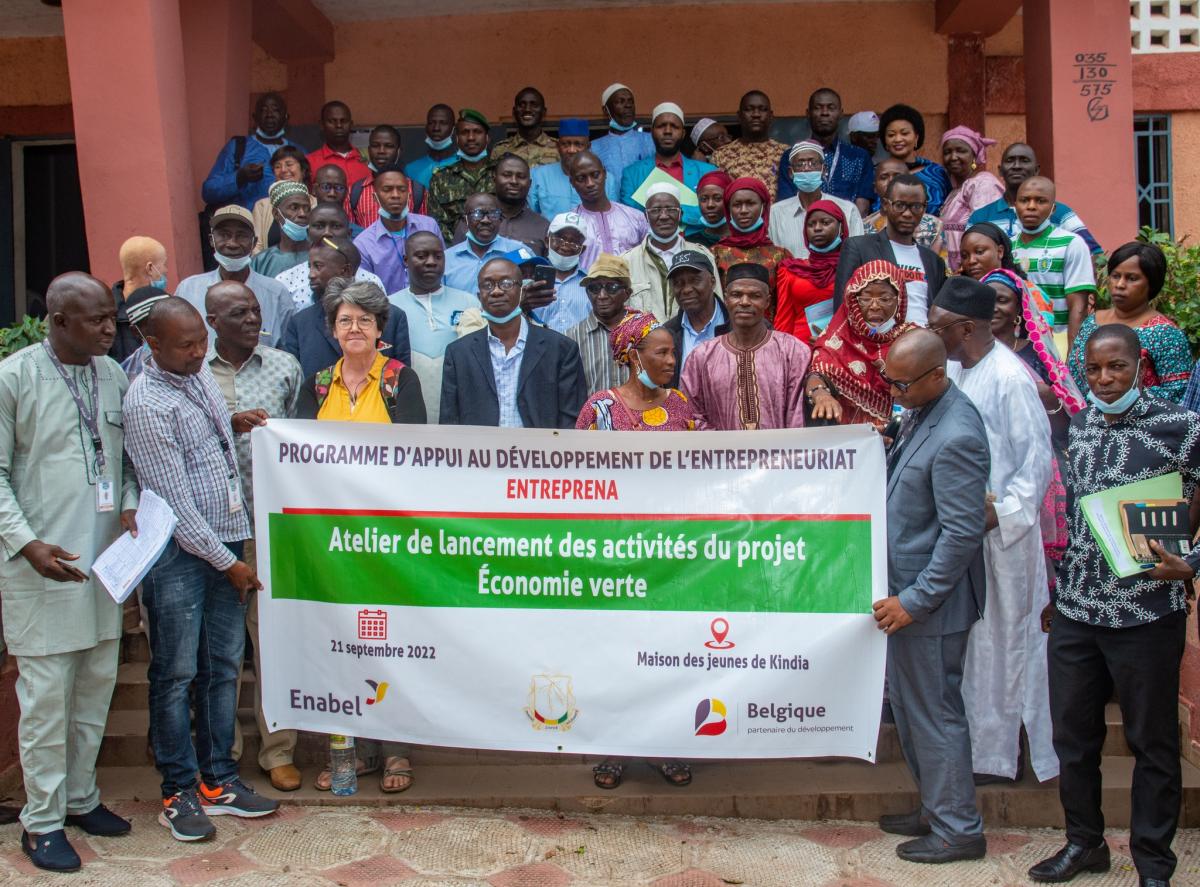
Guinée: lancement d'un nouveau projet « Économie verte »!
Mamadou Moustapha BALDE | 16/11/2022
Développer le potentiel environnemental et touristique de Kindia est au cœur du nouveau projet « Économie verte ». Financé par le Royaume de Belgique (1,9 millions d’euros), le projet vise la promotion de l’écotourisme, la conservation et la valorisation des ressources naturelles en participant notamment à une agriculture respectueuse de l’environnement ainsi que la mise à niveau de filières et chaines de valeur d’importance. Le projet a officiellement été lancé par le Gouverneur de la région de Kindia, Elhadj Ibrahima Khalil Condé, en présence du Ministère de la Culture, du Tourisme et de l’Artisanat, l'Ambassade de Belgique en Guinée, ainsi que d'un panel représentatif d'acteurs et d'actrices de l'économie verte. Cette action complète notre dispositif de soutien à l’entrepreneuriat (agricole, urbain, féminin, créatif) visant à développer une croissance économique inclusive sur l’axe Conakry-Kindia-Mamou.
-
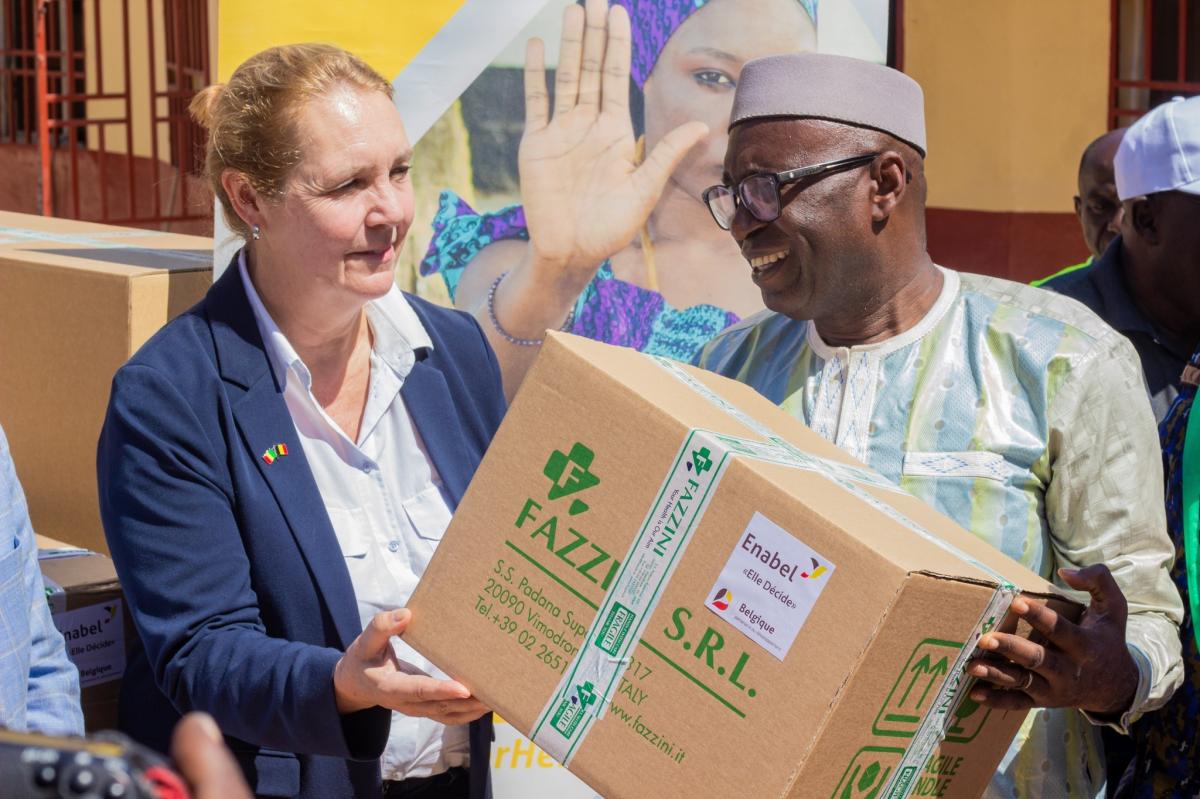
Guinée: Des équipements et matériels médicaux pour améliorer l'accès aux droits sexuels et reproductifs
Mamadou Moustapha BALDE | 16/11/2022
L’accès aux soins de qualité ainsi qu’aux droits sexuels et reproductifs, notamment pour les femmes, est un réel défi en Guinée. Avec ses partenaires, notre projet #SheDecides financé par le Royaume de Belgique, travaille à renforcer les capacités des centres de santé à travers des formations sur-mesure ainsi que la mise à disposition d’équipements médico-techniques. Ainsi, un lot d’équipements composé entre autres de tables de consultation gynécologique et d’accouchement, de lits d’observation et de matelas, de boîtes césarienne et gynécologique… a été remis au Ministère de la Santé, par la Représentante Résidente de Enabel, Krista VERSTRAELEN, à destination des formations sanitaires.L’action vise à améliorer le plateau technique des structures sanitaires de Kindia et Mamou dans le cadre des soins obstétricaux et néonatals d’urgence (SONU), incluant la prise en charge des survivantes des violences basées sur le genre (VBG).
-
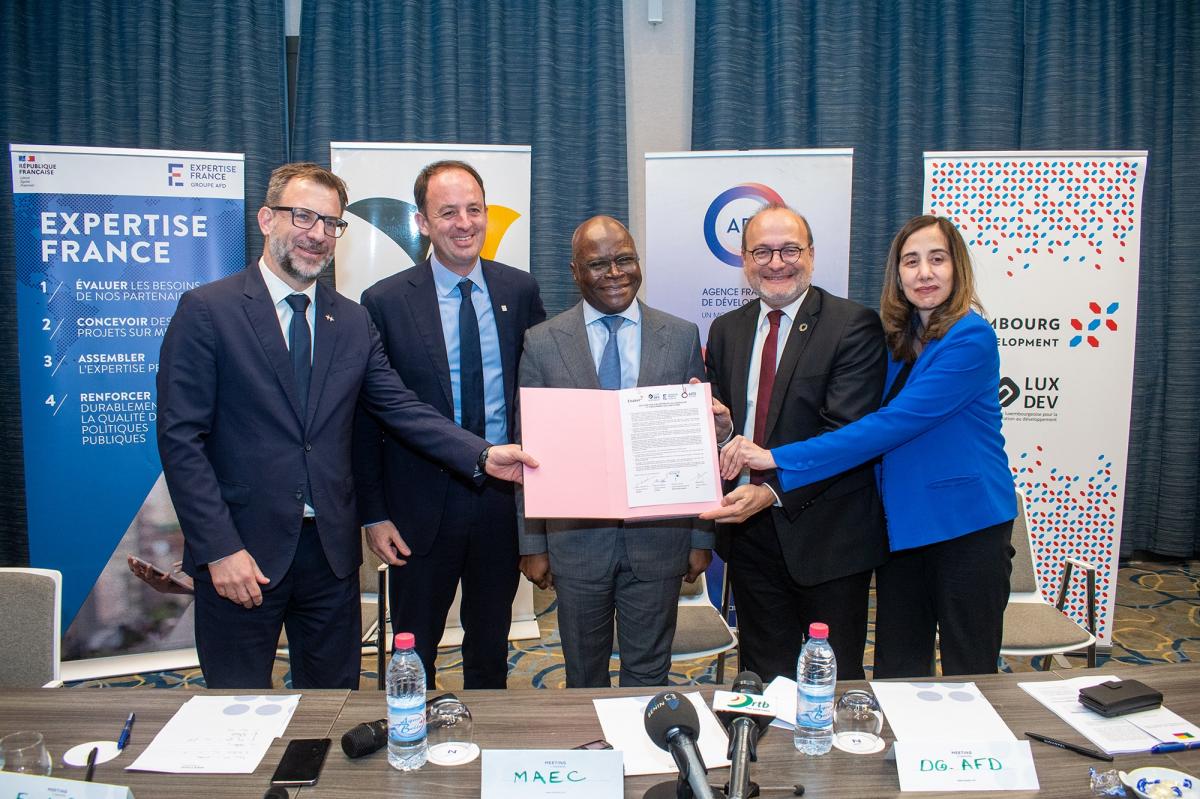
Bénin: Enabel, le Groupe AFD et LuxDev signent un Mémorandum of Understanding pour une coopération accrue entre les agences de développement européenn
Reece-hermine ADANWENON | 15/11/2022
COMMUNIQUE DE PRESSE Cotonou, le 15 novembre 2022 M. Rémy RIOUX, directeur général de l’Agence française de développement, M. Jean VAN WETTER, directeur général d’Enabel, M. Manuel TONNAR, directeur général de LuxDev et Mme Rima LE COGUIC, directrice générale adjointe en charge des opérations d’Expertise France, filiale du groupe AFD, sont au Bénin du 14 au 16 novembre 2022. A l’occasion de cette visite, M. Patrice TALON, Président de la République du Bénin, a reçu les représentants du groupe AFD, d’Enabel et de LuxDev lors d’une audience protocolaire, en présence de l’ambassadeur de France M. Marc VIZY. La mission conjointe a permis la signature d’une convention de financement, d’un accord de partenariat et d’une déclaration d’intention de collaboration le lundi 14 novembre 2022. Cette visite permet de réaffirmer l’engagement européen, à travers la Team Europe, en faveur de la croissance durable du Bénin, à travers la signature d’accords et conventions, ainsi que la rencontre des partenaires béninois avec lesquels le groupe AFD, Enabel et LuxDev et l’UE collaborent dans des secteurs stratégiques identifiés comme prioritaires dans la coopération entre le Bénin et l’Europe, tels que la croissance durable, à travers notamment des investissements stratégiques dans la formation professionnelle, la santé publique, la culture et le patrimoine, et l’agriculture, les énergies renouvelables ou le secteur portuaire. La mission conjointe a permis la signature d’une convention de financement, d’un accord de partenariat et d’une déclaration d’intention de collaboration le lundi 14 novembre 2022. Ainsi, M. Rémy RIOUX, M. Jean VAN WETTER et Mme Rima LE COGUIC ont signé un accord-cadre de partenariat, un Memorandum of Understanding, entre l’AFD, Enabel et Expertise France. Cet accord permettra de renforcer la coopération entre ces institutions et notamment de poursuivre la collaboration entamée en faveur des partenaires du Sud, et définir des priorités géographiques et sectorielles d’intervention communes. La signature a eu lieu en présence de M. Aurélien A. Agbénonci, Ministre des Affaires Étrangères et de la Coopération. Alors que l’Etat béninois s’est engagé dans la modernisation du système d’information de la Direction Générale des Impôts, M. Romuald WADAGNI, Ministre d’Etat en charge de l’économie et des finances et M. Rémy RIOUX ont signé la convention de subvention du Projet d’Appui à la Modernisation des Systèmes d’Information (PAMSI). L’objectif du projet est de contribuer à la hausse du taux de pression fiscale, de 3 à 4 points de pourcentage du PIB en 5 ans. Expertise France appuiera la DGI à travers la mobilisation d’expertise à la demande pour la mise en œuvre du projet. Enfin, toujours dans l’esprit des Team Europe Initiatives, Mme Rima LE COGUIC, M. Rémy RIOUX, M. Manuel TONNAR et M. Jean VAN WETTER ont concrétisé, à travers la signature d’une déclaration d’intention conjointe, leur volonté d’intensifier encore leur collaboration. A l’origine des premières initiatives multi-agences symboliques, telles que VET Toolbox dans le domaine de la formation professionnelle, Enabel, LuxDev et le groupe AFD renforcent actuellement leur coopération via des projets et programmes de développement durable sur le terrain. Outre la signature de ces trois accords et convention, M. Rémy RIOUX, M. Jean VAN WETTER, M. Manuel TONNAR et Mme Rima LE COGUIC ont pu aller à la rencontre des institutions, entreprises et organisations de la société civile travaillant sur divers projets auxquels collaborent le groupe AFD, Enabel et LuxDev, avec l’Union européenne. Durant la mission, M. Rémy RIOUX, M. Jean VAN WETTER et Manuel TONNAR rencontreront à Dassa les acteurs du milieu de la santé du Département des Collines et l’équipe du projet EQUITE. En partenariat avec le Ministère de la Santé et le Ministère de l’Enseignement Supérieur et de la Recherche, le projet est mis en œuvre par Enabel sur financement de l’AFD. Il vise à renforcer les capacités techniques, humaines et de gouvernance des structures de santé, et améliorer la qualité de la prise en charge des soins obstétricaux et néonatals d’urgence (SONU) et des maladies non transmissibles (MNT). La visite a également permis la rencontre d’autres partenaires tels que le Ministère de l’Économie et des Finances, le Ministère de l’Agriculture, le Ministère des Enseignements Secondaire, Technique et de la Formation Professionnelle (METFP), l’Agence de Développement de l'Enseignement technique (ADET), l’Agence pour la Construction des Infrastructures du Secteur de l'Éducation (ACISE), la Caisse des Dépôts et des Consignations (CDC), la Banque Internationale pour l'Industrie et le Commerce (BIIC), Sèmè City et le Port autonome de Cotonou. « Très heureux de signer ces accords de coopération avec Enabel et Luxdev, en format groupe AFD, avec Expertise France, et de le faire au Bénin : la Team Europe est à la disposition des autorités béninoises pour contribuer à la mise en œuvre de ses priorités dans des domaines comme la formation professionnelle, la croissance verte, la santé ou la culture. Au-delà du Bénin, c’est une offre européenne intégrée que nous proposons à tous les pays partenaires avec la Commission Européenne et toutes les banques et agences de développement, pour plus d’impact et en nous alignant sur les Objectifs de Développement Durable. » Rémy RIOUX, Directeur Général, AFD « Enabel est un partenaire européen important, membre comme nous du Practionners’ Network. De par son histoire, son organisation, sa langue, Enabel est plus qu’un simple partenaire, c’est véritablement la sœur d’Expertise France. Que ce soit sur les plans stratégique, organisationnel ou opérationnel, nous nous ressemblons beaucoup, et nous nous réjouissons d’approfondir nos échanges en formalisant nos relations à travers cet accord de partenariat ». Rima Le COGUIC, Directrice Générale Adjointe chargée des Opérations, Expertise France.« L’objectif du MoU pour Enabel est avant tout d’avoir plus d’impact ensemble dans les actions que nous menons avec nos pays partenaires tel que le Bénin, et au bénéfice des populations. Il est évidemment dans l’intérêt pour nos partenaires béninois, et africains en général, que les agences travaillent mieux ensemble dans une approche conjointe alignée sur les priorités des pays partenaires. » Jean VAN WETTER, Directeur Général, Enabel« Nous sommes ici avec des projets et financements concrets qui ont été rendus possible à travers la présence de l’AFD et d’Enabel au Bénin dans un esprit ‘’Team Europe’’. Nous voulons être actifs ici dans les domaines de la formation professionnelle, de finances inclusives et de la digitalisation. Nous voulons, à travers la signature de ces accords, crée des synergies, avoir plus d’impacts et être plus forts ensembles. » Manuel TONNAR Directeur Général, LuxDev.
-
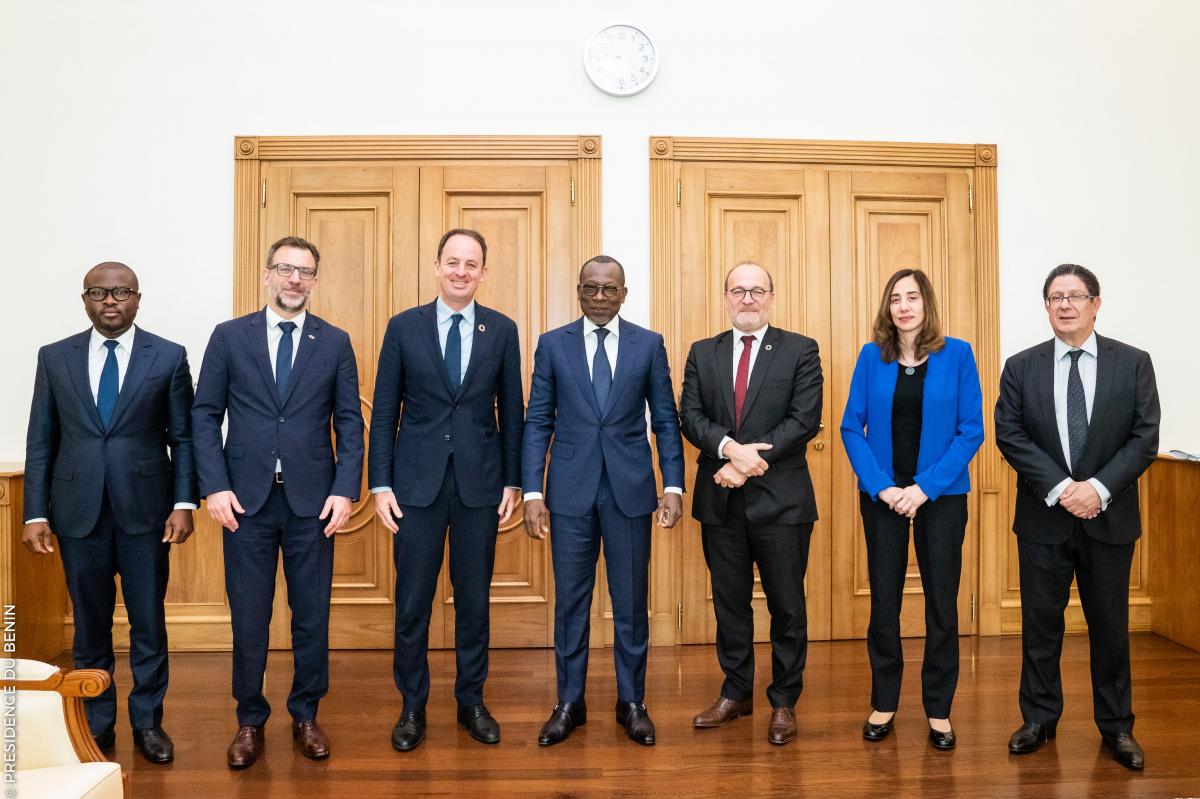
Au Bénin, Enabel signe des conventions de partenariat avec AFD, Expertise France et LuxDev
Reece-hermine ADANWENON | 15/11/2022
C’est avec honneur et fierté que le Bénin, terre des amazones a accueilli la signature d’un accord de partenariat entre Enabel, AFD et Expertise France et d’une déclaration d’intention quadripartite entre AFD, Expertise France, Enabel et LuxDev. C’est dans le cadre de la mission conjointe des DG Enabel, AFD, LuxDev et de la DGA Expertise France que ces conventions ont été signées le lundi 14 Novembre 2022 au Novotel de Cotonou en Présence des Ministres des Affaires Étrangères et de la Coopération et de l’Enseignement Secondaire et de la Formation professionnelle.Dans un premier temps, M. Rémy RIOUX, M. Jean VAN WETTER et Mme Rima LE COGUIC ont signé un accord-cadre de partenariat entre l’AFD, Enabel et Expertise France. Cet accord permettra de renforcer la coopération entre ces institutions et notamment de poursuivre la collaboration entamée en faveur des partenaires du Sud, et définir des priorités géographiques et sectorielles d’intervention communes. En second lieu, dans l’esprit des Team Europe Initiatives, Mme Rima LE COGUIC, M. Rémy RIOUX, M. Manuel TONNAR et M. Jean VAN WETTER ont concrétisé, à travers la signature d’une déclaration d’intention conjointe, leur volonté d’intensifier encore leur collaboration. A travers ces partenariats, un cadre de coopération plus accrue vient d’être définit pour servir les besoins des pays bénéficiaires. Il permettra de : - identifier les priorités géographiques et sectorielles communes, ainsi que celles à explorer et consolider ensemble, tel que le secteur culturel dont le Bénin est une très belle illustration; - échanger sur les outils, les méthodes, les stratégies opérationnelles et les bonnes pratiques ; - soutenir une dynamique de capitalisation d’apprentissage sur les bases des interventions et expériences des institutions respectives.
-
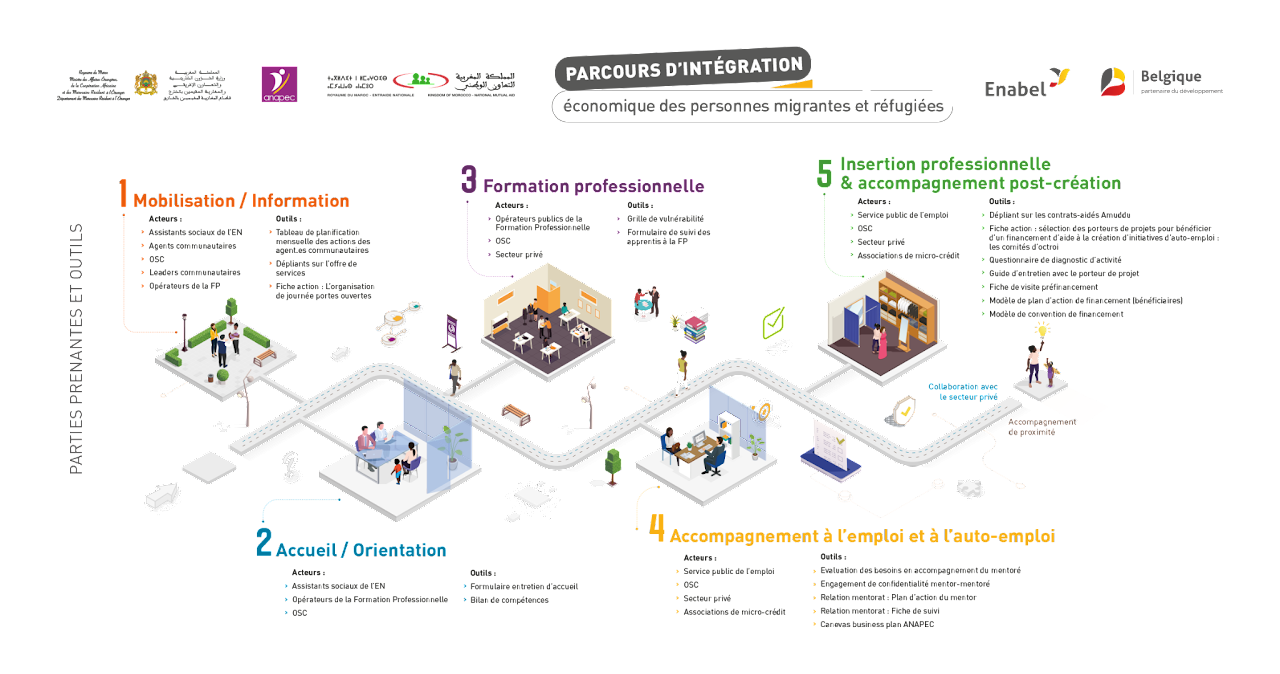
Maroc: Capitalisation du projet Amuddu
Clara HUYGHE | 14/11/2022
Pour en savoir plus sur le projet, nous vous invitons à consulter le site du projet Amuddu rassemblant tous les outils de capitalisation développés (guides, fiches capitalisation, vidéos et témoignages): https://rb.gy/w9zuq5 Après 4 années de mise en oeuvre, le projet « Amuddu : Appui à la mise en œuvre de la Stratégie Nationale d’Immigration et d’Asile » financé par la Belgique, a été mis en œuvre par Enabel en partenariat avec le Ministère délégué chargé des Marocains résidant à l’étranger, l’Entraide nationale, l’Agence Nationale de Promotion des Emplois et des Compétences (ANAPEC) et des organisations de la société civile, visait à améliorer l’employabilité des personnes migrantes et réfugiées au Maroc.Pour le rappel, le Maroc est connu pour être un des principaux pays d’émigration au monde et est également devenu, au fil des années, une terre de transit et même d’accueil des personnes migrantes. Une Stratégie Nationale d’Immigration et d’Asile (SNIA) visant à « assurer une meilleure intégration des immigrés et une meilleure gestion des flux migratoires dans le cadre d’une politique cohérente, globale, humaniste et responsable » a été adoptée en 2014.Afin de soutenir la mise en œuvre de cette stratégie, le projet Amuddu s'est basé sur l’hypothèse selon laquelle l’intégration économique des personnes migrantes est une porte d’entrée et un catalyseur vers leur intégration. Dès lors, l'intervention s'est focalisée sur l’employabilité des personnes migrantes via trois résultats spécifiques.Comme vous pouvez le voir sur le schéma, l'amélioration de l’employabilité des migrants passe, d’une part, par une adaptation de leur profil professionnel afin de mieux répondre aux besoins du marché de l’emploi et, d’autre part, par un meilleur accès aux mesures existantes d’appui à l’insertion économique. Sans le renforcement des partenaires et sans une coordination efficace des actions des opérateurs et parties prenantes, cette employabilité reste cependant souvent hypothétique. C’est pourquoi cette intervention visait à adopter une approche holistique, ciblée et intégrée de la migration.Pour ce faire, le projet a accompagné les institutions publiques marocaines pour améliorer leurs services visant l’intégration économique des personnes migrantes via des formations professionnelles et des services d’accompagnement à l’emploi et à l’auto-emploi. Cette approche visait à renforcer les effets positifs de la migration sur le développement du Maroc à travers l’amélioration de l’employabilité des personnes migrantes, leur autonomie et leur capacité à contribuer à la dynamisation de l’économie marocaine.
-
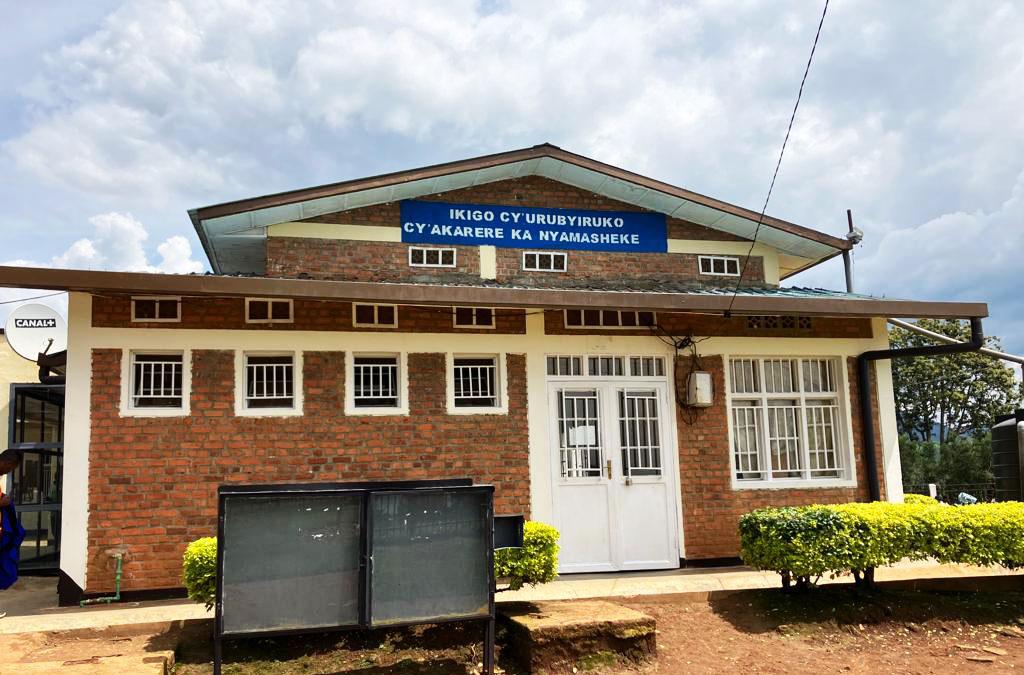
A new Youth-Friendly Centre was launched in Nyamasheke District, Western Province of Rwanda
Denise NSANGA | 14/11/2022
The Nyamasheke Youth-Friendly Centre was launched on 11 November 2022 in Kagano Sector, Nyamaseke District. Renovated and equipped with the support of Enabel’s Barame project, the Centre will deliver Adolescent, Sexual & Reproductive Health (ASRH) services to Nyamasheke Youth. Started in January 2021, the programme aims at enhancing Youth-Friendly Centres to deliver high-quality youth-friendly services among young people and adolescents including Adolescent, Sexual and Reproductive Health services, improving young people's knowledge of ASRH and prevention of Gender-Based Violenve and drug abuse. In addition, Youth Friendly Centres were provided with equipment to enable the youth play, socialise and acquire economic skills including sewing, shoe making, hair dressing to name but a few. The Youth-Friendly Centres were renovated or constructed and equipped in partnership with the Ministry of Youth, Rwanda Biomedical Centre (RBC) and Society for Family Health (SFH) Rwanda. In total, eight Youth Friendly Centres have been renovated and equipped with Belgian support in the framework of Enabel's Barame project. They were reinforced in the seven districts of Barame intervention namely Karongi, Nyamasheke and Rusizi in the Western Province, Gisagara in the Southern Province, Gakenke and Rulindo in the Northern Province and two centres in Nyarugenge district, City of Kigali.
-
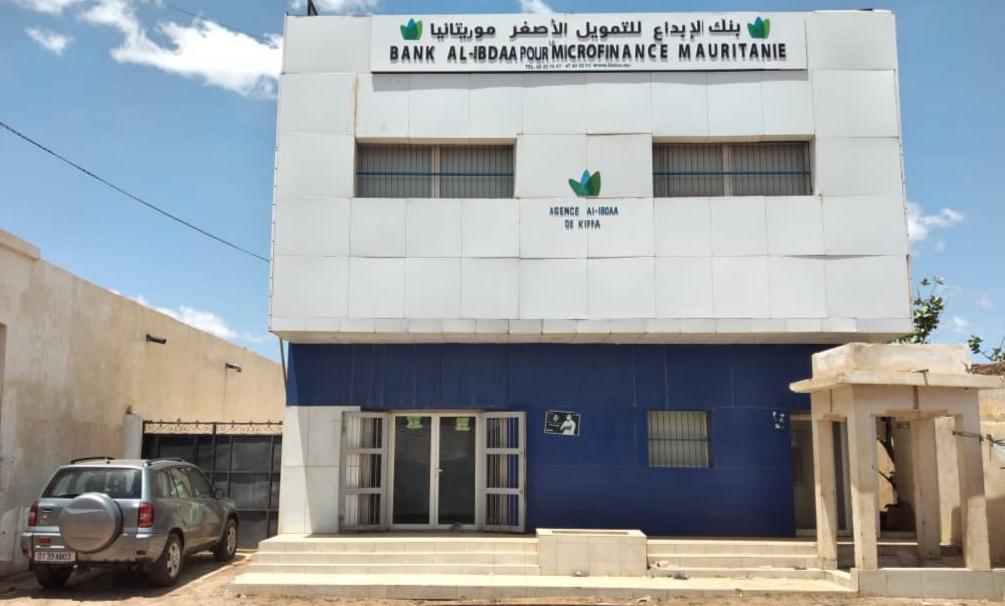
En Mauritanie, Enabel innove le secteur de la microfinance
Aminata KANE | 11/11/2022
Le programme RIMFIL financé par l'Union européenne et mis en œuvre par Enabel vise la promotion du développement des filières agro-pastorales et durables.C'est dans ce cadre qu'Enabel appuie et renforce les capacités de deux Institutions de Microfinance (IMF) :Djikké (coopérative mauritanienne de microfinance) etla Banque AL- IBDAA.Suite à la signature des partenariats l'ouverture de plusieurs agences dans des villes rurales est en cours (Barkeol, Kankossa,Tintane etc.). La banque IBDAA a ouvert une agence à Kiffa dans l'Assaba. L'innovation concrète d'Enabel est dans le renforcement des capacités d'intervention (techniques et institutionnels) des deux IMF via la promotion de mécanismes et de produits financiers adaptés aux acteurs des filières agricoles et pastorales. Cette adaptation se traduit par la production de fiches de référentiels techniques et économiques, qui apportent des éléments clairs afin d’éclairer les financiers sur l’octroi d’un crédit aux producteurs :• Cout de production• Durée de production• Accès à l’eau• Période• Saison…Transposer via un référentiel de données techniques et économiques, cette sélection simple et efficace permet d’éclairer la décision des financiers sur l’octroi. Par exemple, si un producteur de tomates recherche un financement pour sa récolte, le financier saura grâce aux fiches que la récolte de tomates prend 3 mois, donc le paiement se fera à ce moment. Cette innovation fournie au secteur de la Microfinance en Mauritanie une avancée qui est une première dans ce domaine. Se rajoute à cela la synergie conseil. Les facilitateurs qui ont été formés sur l'approche Champ-école Agropastoral du programme RIMFIL appuient les IMF.Open.Enabel - Belgian Development Agency / En Mauritanie, on renforce les capacités techniques et organisationnelles des organisations communautaires via les "Champs Ecoles Agro Pastoral"Le facilitateur devient le conseiller qui sécurise l'activité et renforce la pertinence de la demande de crédit. Une réelle structuration est mise en place à travers les modalités de caution solidaire. Les producteurs sont liés, si l'un d'entre eux ne peut honorer le paiement du crédit, le groupe paie à sa place. Cette réalisation majeure met en avant la contribution d’Enabel et celle de ses partenaires à l’accès durable des produits et services financiers adaptés aux besoins des populations rurales des régions du sud-est mauritanien (l’Assaba, le Guidimakha et les deux Hodhs).
